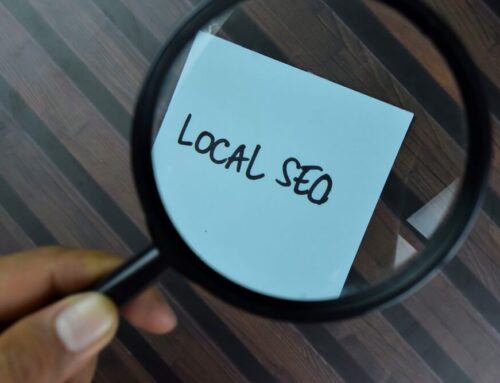In addition to the most important ranking factors we just reviewed, you also need to consider local SEO for your law firm.
When you travel or visit a new city, how many times have you googled a phrase like “good Thai restaurant near me”? How frustrated would you be if you were in New York and Google showed you Thai restaurants in Florida? Pretty annoyed, I guess.
The idea of searching for results only in a specific geographic location is known as local SEO and it’s super-important for law firms.
Law firm local SEO is a little bit different from traditional SEO and something you want to get right for your business if you want to generate high-quality leads.
For many legal practice areas, your prospective clients want to work with someone local. Sure, with powerful legal marketing you can get customers from all over the country, especially as you build your authority in niche areas, but it’s important to rank extremely well locally first.
Here’s a look at the different ways you can implement law firm local SEO on your website to improve your local rankings and increase the number of relevant targeted leads that come to you.
Benefits of local SEO for your law firm
Let’s consider how the majority of people begin their search for a law firm. It either involves asking a friend or colleague who they’d recommend or heading to the internet to do preliminary research.
Directory listings, articles, reviews, and websites are all commonly used by people to find an attorney, and they often make use of these resources after getting a referral.
If a potential client searches for “law firm in [your area]” and you don’t show up on the first results page(s), what will they conclude? That you don’t exist or are not very good, even if they found out about you from a colleague or friend.
If you run a law firm in New York, you really need to take specific measures to ensure your website shows up on Google for these specific search terms relevant to your location.
When you think about the type of traffic that comes through local search, it’s super-targeted and quite a warm lead. If someone is searching for law firms, there are a range of things they could mean by that. They might be looking for a job, they might be looking to learn more about the legal industry, or they might just be like me, writing about law firm marketing.
However, when someone is looking for a law firm in a specific area, you can assume a certain level of intent and/or need. You’re unlikely to search for law firms in New York if you have no interest in hiring a law firm in New York.
So, from a marketing standpoint, dominating local SEO gives you a great opportunity to convert free traffic into paying clients. What’s more, the intensity of the competition is somewhat lower. Ranking in the top position for a search term like “law firm” will be a difficult task for most companies. There is just simply too much competition. But the more specific you get with your location, the less competition, and therefore, the easier it will be to rank more highly.

Keyword research for local SEO
One of the first steps you should take to optimize your site for local SEO is to think about what keywords you’re using. The benefit of local SEO is that it’s pretty obvious which keywords you should be targeting based on your location.
Ideally, you want to let Google know that each page of your website is for a local business. True, you might use your blog or resources page to create content that speaks to a wider group of people beyond your immediate geographic location. But your home page, services page, contact page, and about page should all highlight your location.
If you focus on family law in New York, key phrases you might want to use could include:
“Family law firm in New York”
“Family law attorney New York”
If you scroll down to the bottom of any results page on Google, you’ll see a range of similar searches that show you just how detailed you can go.
Instead of just using “New York,” you should also go further by specifying which area of New York you’re based in, like Queens or Manhattan.
When it comes to enhancing your law firm’s keywords with local SEO in mind, consider updating the following spots. However, be careful not to “keyword stuff.” If every other word on a page is your location, not only will it not be an enjoyable experience for readers but Google won’t like it either.
With local SEO you’re going to do many of the same things you learned to do for on-page optimization, but this time make sure you include your geographic location.
Optimizing your home and contact pages along with practice area pages for geographic keywords will help the other parts of local SEO to kick in. The way to get started is to focus on basics like title tags, H1 tags, body content, meta descriptions, and alt text.
Title tag
Your title tag for your website should indicate the city or region you operate in, as well as your main keyword, e.g., “Family Law Firm Brooklyn NY.”
H1 tag
You should find at least one opportunity to include your location plus a keyword in one of your H1 tags. Your H1 tags are there to split the content up and provide a hierarchy for the content on each page.
The contact page is often a great place to input your location and keyword into an H1 tag. When visitors have reached your contact page, it seems reasonable that they’d like a quick reminder of who you are and where you’re based, and it won’t come off as spammy.
Just remember that headlines with a benefit and unique selling position — and not just a keyword — will get you more leads every time.
Body content
Throughout the body of your web page content, wherever it feels natural, try to include the location of your law firm as well as the keyword. The body content is often where law firms should use variations of the core keyword phrase. For example, instead of just writing “family law firm New York,” you might have a sentence that looks like this:
“We’re passionate about helping you, the people of New York, solve issues regarding family law. Families are complicated, your law support shouldn’t have to be.”
Meta description
The meta description, even though in recent years it provides less footing for SEO click-throughs, is useful for people who want to check that the link they’re about to click is relevant for them. In this example, you can see that Mandel is a law firm specializing in family law and they’re based in New York. If this was something you were looking for, you’d likely click through to visit this law firm’s website.
Compare that to this law firm where, other than the .uk in their domain, it’s unclear where they’re based.
Alt text
If you use images on your law firm’s website (and you should), the alt text is a great way to indicate to Google where your main practice is based and what services you offer. Images are indexed by Google, so having images like these show up on search results is a powerful benefit.
All of these images showed up on Google for a search of “family law firm New York.” Each of the pictures clicks through to various different New York-based law firms. Don’t ignore your images when it comes to local SEO, and make sure to take pictures at your office and at local events. You can then use those images on Google My Business and on social media.
Mobile-first local SEO
A vast majority of searches are happening on people’s mobile phones, more so than on desktop computers. This is largely due to people wanting access to information exactly when they want it. Google has updated their own algorithm to support this. If your website isn’t ready for local SEO on mobile, you’re leaving potential clients behind.
When I type “family law firm,” Google understands I might be looking for a local law firm and the first suggestion is “near me.” Now, when you click this, Google will provide a number of recommendations for you, located near where you are right now. It’s a no-brainer, then, that you should optimize your site to support such searches.
In order for your law firm SEO website to rank well for mobile searches, you need to make sure it’s fully optimized with a responsive theme. You should also make sure you have included important information such as accurate contact details, addresses and team member names. Adding this data will give your website more authority within the search results.

Legal directories
With the dominance of the internet, people are using print directories like the Yellow Pages less often, but this doesn’t mean directories aren’t still used online. In fact, online legal directories are a great way to improve your local SEO ranking as well as improve the domain authority for your site. Just don’t go overboard on this, because it could hurt your traditional search engine ranking if you start getting dozens or hundreds of low-level directory links.
If you want to increase your domain ranking further, you need people from authoritative sites to link to yours. This isn’t an easy task and usually involves guest-blogging on a high level and the best legal-related sites. This is a time-consuming task and is more a long-term strategy, but it is more powerful than the basic directory listings that are used in local search.
It’s very revealing to search Google for your main keywords and see what directories come up.
If Google is ranking certain directories well, they might be worth getting listed in. But if they have no visibility and have stupid names like “lawyer-link-directory-SEO.com,” then you want to run in the other direction.
Updating “data providers” with your correct name, address, and phone number can also be a good idea. Infogroup, Acxiom, Factual, and Neustar/Localeze are the four major providers that push information across hundreds of websites online.
Be sure to update individual listings on sites like the following
- Facebook
- Bing local
- Yelp
- com
- Your local Chamber of Commerce
- Your local Better Business Bureau
Even making sure a small number of the best listings have your accurate information can go a long way.
NAP citations
NAP citations are important for your local SEO. NAP stands for “name, address, phone number.” If you want to increase your local SEO rankings, be sure to include your firm’s name, address, and phone number on your website. But more importantly, the way you address these details should be consistent. For example, if you use “road” in your address in one instance, don’t then use the abbreviation “Rd.” in another instance. Remember to periodically monitor your listings, especially if your firm’s address changes.
Google My Business
Although it’s important to make sure your website is optimized for local SEO results, you also need to make full use of your Google My Business account.
You’ll notice Google shows you not only the companies’ names but their reviews, contact details, opening times, links to their websites, and directions to the firms.
To get started, search for Google My Business and set up a basic account.
You’ll then have the opportunity to input your details. Be as comprehensive as possible.
When adding your law firm’s details, it’s important that the information you provide is consistent with what you show on your website. Make sure that if you’re providing phone numbers, you use local area codes to indicate to Google that you are actually a local firm. You should also make a Bing local page.
Reviews
It should come as no surprise that Google favors companies that use its tools, and one specific tool relevant to local SEO is Google reviews. When you generate reviews on Google, you can increase your search rankings. Google reviews directly impact a local business’ ranking within the search results.
Positive reviews are not only good for local SEO, but they can help establish your law firm as an industry leader.
Making use of Google reviews and reaching out to your top clients to request a review is a great way to increase your rankings and protect referrals.
Make note of how many reviews your competitors have, because that will partially determine what you need to do to impress potential customers and satisfy Google.
Whatever you do, don’t get fake reviews or pay for them. It’s far better to email your customers or send them a postcard with instructions on how to post an online review. You might say something like, “Please avoid using words such as ‘best’ or ‘guarantee’ and simply explain what you liked about working with us.”
Send them something like this:
Shortened URL to your Google My Business page
facebook.com/attorneyprofile
avvo.com/attorneyprofile
In addition to Google My Business, you should also ask for clients to post reviews on Facebook and AVVO. Yelp and Citysearch are other places where you can get reviews. Set up a Google alert or brand-mention tracking tool and respond to any negative reviews.
The future of local SEO
So, now you know that you need to optimize your website’s pages for local search, create a Google My Business page, get into some high-quality online directories using a consistent name, address, and phone number, and ask for some reviews from your clients.
What if I told you that doing these things wasn’t enough? You’d probably be mad at me, but I have to tell you it’s true. Search engine optimization firms have been doing most of these things for years, so Google has to get way out ahead of it and find ways to prevent only the companies that get good at these tactics from ranking high in searches.
Add to that the fact that there are plenty of unscrupulous lawyers and attorney SEO agencies that are willing to create and post fake reviews and fake profiles in order to game the system. Not only are such efforts bound to fail, but they can pose an ethics violation problem (not good for a law firm!).
Currently, local search comprises about one-third engagement, one-third local data, and one-third traditional SEO like the on-page keyword plus geographic targeting and backlinks.
Get more engagement with a few of these tactics
Add these items to your local SEO checklist:
Check your Google My Business timeline to see if people are asking questions of your business. You might not be getting notified and you will look like you are missing in action if you don’t respond.
Review your knowledge panel, which is the little box that comes up to the right when people search for your company name. It’s your responsibility to keep that updated. If it’s out of date, people won’t engage with the brand they can’t find.
Google can see if people are opening your emails in Gmail, so do a good job engaging instead of selling customers, just in case Google uses this in the algorithm for the local map listings.
Work on your social media engagement metrics, even though we are not 100% positive whether Google will use these directly as a ranking factor.
Set up your major search terms in Zapier for anyone who mentions your keywords in your location, and if there is a way to engage them online, provide helpful information. Make it clear that people can send texts to your business.
Provide clear travel directions to your firm, so people can visit and meet with you easily.
Takeaways
A local SEO campaign is a great way to increase your overall organic search rankings and make the most of the hyper-targeted traffic you can gain from good local SEO rankings.
Steer clear of gaming the system and prepare for a day when engagement metrics are used even more for local map listings than merely filling out a business profile, managing directory listings, and getting reviews.
There aren’t too many law firms that are making serious efforts to get their local SEO right, giving you the opportunity to become the industry leader.
For the best results, follow the steps we’ve listed above and watch your rankings increase.
SEO is powerful, but have you heard that some bloggers have paid little attention to it and yet still manage to have famous blogs? That is because they do advanced and unique content marketing.
Many of these same bloggers have also admitted that they missed a few SEO steps. This resulted in them missing the even better results that the blogs offering valuable content with smart link and SEO strategies were able to get.
If you can stay the course and follow through on the content marketing tips in the next section and use what you have learned about SEO, you will be well on your way to dominating your niche and getting consistent leads.



![Local SEO for Law Firms [How to Optimize]](https://rosystrategies.com/wp-content/uploads/2019/11/Local-SEO-for-Law-Firms-How-to-Optimize.jpg)






